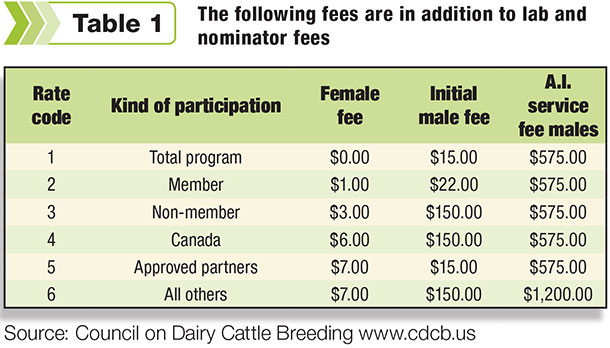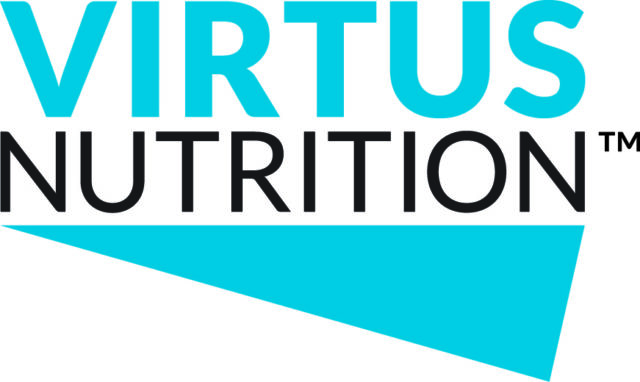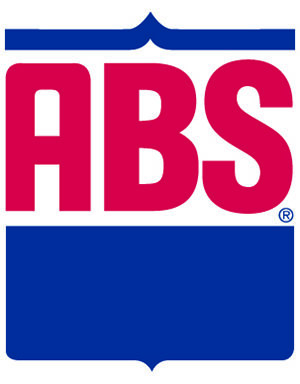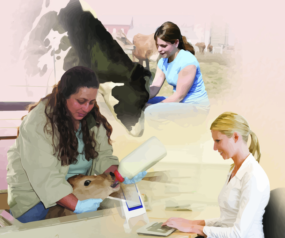Producers and industry personnel gathered May 14 in Tulare, California, and May 15 in Bakersfield, California, to discuss important factors contributing to genomic testing.
Hosted by AgriTech Analytics (ATA) Dairy Records Processing Center, the meetings focused on what dairy producers need for a successful genomic testing program: requirements for animal identification, maximizing the reliability of your genomic investment and participation in data collection programs to minimize additional fees paid for genomic evaluations.
The following are common questions and responses:
Q: When it comes to genomics, why do official milk testing records matter?
AgriTech Analytics presented the information that is vital to genomics in order to reach a higher reliability of the genomic test result. One of those factors is processing your Dairy Herd Improvement (DHIA) milk test with a Dairy Records Processing Center (DRPC). Known as phenotypic data, real-life production of dams and their offspring contributes to the accuracy and reliability of genomic evaluations.
This phenotypic milk production and linear type data is vital to future genomics, and continued phenotypic data contribution ensures genomic evaluations are accurately calibrated for the national dairy herd. Producers may genomic test their cattle without contributing their phenotypic data to the system, but without actual data in the system to help validate predictions, it leads to less reliable genomic evaluations.
Q: How can I avoid additional fees for genomic testing?
Producers not contributing phenotypic data to the genetic evaluation system will be faced with additional fees required by the Council on Dairy Cattle Breeding (CDCB). AgriTech Analytics reviewed the fee schedule and how producers can avoid paying extra fees above and beyond the cost from the genotyping provider for the test.
Herds qualifying for the highest tier, total program, includes processing your certified DHIA test with a DPRC, as well as participating in a breed association type classification of animals. If a producer is on the total program, there are no additional fees for genomic testing heifers.
A producer would be considered a member if they only process their certified DHIA test and do not classify their dairy cattle. This would then cost an additional $1 per genomic heifer test. If a producer chooses to genomic test but does not process their certified DHIA test or classify their animals, then the producer is considered a non-member and will pay an additional $3 per genomic heifer test.

Q: How can I make sure that genomic testing is resulting in the highest reliability?
There are several other pieces of information that need to be included when genomic testing in order for the genomic tests to reach their highest reliability:
- Correct breed, sire NAAB code and an RFID tag of the heifer (referred to as a “usable record”).
- DHIA test components such as fat, protein, somatic cell counts, etc.
- Use the same herd code to DHIA test and genomic test.
- Process your DHIA test with “at least 20 percent (or 50 animals) of the eligible first-lactation animals calving in the prior 14 months and receive official cow evaluations for milk yield,” according to the CDCB fee schedule.
Q: Are there cutoff dates for avoiding additional genomic testing fees?
Yes! Genetic evaluation cutoffs occur three times a year. These dates are key to becoming a total program or member participant in order to waive the additional fees. You must have these usable records processed with your DRPC before the following dates in order to qualify:
- July 10, 2015, for August evaluation
- Oct. 30, 2015, for December evaluation
- Feb. 26, 2016, for April evaluation
Q: How can genomic test results be loaded into herd management software?
According to Katharine Correia of Holstein Association USA, the web-based program Enlight, developed by Holstein Association USA and Zoetis, helps producers organize their genomic results and put them to work for profitable herd decision-making. Enlight access is available for free as a benefit of using Zoetis’ Clarifide genomic test options.
If you are a DairyComp305 user, your genomic test results can be loaded into DairyComp305 with a specific file provided by such companies as Zoetis and NeoGen.
Dairy genomics has become an important part of our dairy industry. It has helped producers increase the potential of their herd with improved breeding, corrected sire identification, reduced feeding costs, increased production and many more possibilities.







